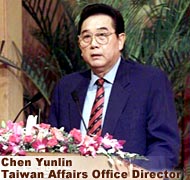 Beijing's Taiwan Affairs Office yesterday said it hoped to resume cross-Straits talks soon but insisted that the one-China principle was a precondition.
Beijing's Taiwan Affairs Office yesterday said it hoped to resume cross-Straits talks soon but insisted that the one-China principle was a precondition.
Chen Yunlin, director of the State Council's Taiwan Affairs Office, said: "Our efforts to push for the resumption of cross-Straits talks and negotiations on the basis of the one-China principle will never slacken."
The top Taiwan affairs official added that everything can be discussed under the one-China principle, including any issue of concern to Taiwan authorities.
Chen made the remarks in Beijing yesterday at a ceremony to mark the 10th anniversary of the semi-official Association for Relations across the Taiwan Straits (ARATS).
The association was established on December 16, 1991. It engaged in talks with its Taiwan counterpart -- the Straits Exchange Foundation (SEF) -- between March 1992 and July 1999, in the absence of official links between Beijing and Taipei.
The talks were broken off after former Taiwan leader Lee Teng-hui introduced his notorious "two states'' theory on July 9, 1999, which defines cross-Straits relations as a state-to-state relationship.
In a prepared speech at yesterday's ceremony, association president Wang Daohan said Beijing ''has always had the utmost sincerity" in its efforts to strive for an early resumption of talks with the Straits Exchange Foundation.
He said the long interruption in cross-Straits dialogue has greatly hurt the immediate interests of people on both sides of the Taiwan Straits, especially those of Taiwanese compatriots.
"Now it is high time that the ARATS and SEF restarted their talks on the basis of their consensus," the top mainland negotiator said.
Wang also called for the establishment of direct trade, transport and postal links between the mainland and Taiwan as soon as possible to benefit people across the Straits.
Wang said the mainland and Taiwan should seize the historic opportunity to strengthen their economic cooperation following their entry into the World Trade Organization.
Both Chen and Wang, however, stressed that it was important that Taipei accept the one-China principle and 1992 consensus before cross-Straits talks could resume.
Chen said: "Whether cross-Straits talks can be resumed and the stalemate in bilateral ties can be broken nonetheless depends on the Taiwan authorities' attitude towards the one-China principle and 1992 consensus."
Taiwan leader Chen Shui-bian, of the pro-independence Democratic Progressive Party, has refused to accept the one-China principle. He denied the existence of the 1992 consensus after he took power in May last year.
The one-China principle holds that there is only one China in the world, that the Chinese mainland and Taiwan are both part of China and that China's sovereignty and territorial integrity cannot be separated.
(China Daily December 17, 2001)
